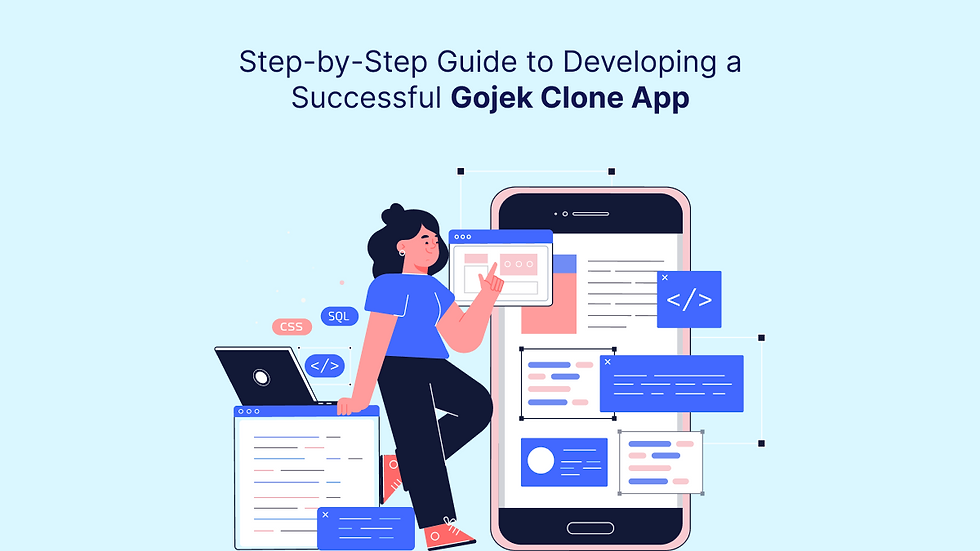Gojek Clone App Development for Multi-Service Businesses
- harryclark852
- Oct 1, 2025
- 5 min read

In today’s fast-paced world, customers demand convenience. They prefer accessing multiple services through a single platform rather than switching between different apps. Gojek, a leading super app, has set a benchmark by offering ride-hailing, food delivery, grocery services, courier delivery, and more under one roof. For entrepreneurs and businesses looking to tap into the on-demand service industry, Gojek clone app development provides a fast, cost-effective, and scalable solution to launch a multi-service platform.
This guide will explain how to develop a Gojek clone app, key features to include, monetization strategies, challenges, and tips for success.
Understanding Gojek Clone App Development
What is a Gojek clone app?
A Gojek clone app is a ready-made software solution that replicates the functionality of the original Gojek platform. It allows businesses to offer multiple services like ride-hailing, food delivery, groceries, parcel delivery, and more in a single application. This eliminates the need to build separate apps for each service, saving time and reducing costs.
Why multi-service apps are popular?
Consumers today want all-in-one solutions. Multi-service apps provide convenience, quick access, and seamless experiences. Businesses benefit from diversified revenue streams, better customer retention, and faster scalability.
Benefits of Gojek Clone App Development
Fast market entry
With a pre-built Gojek clone app, businesses can launch their platform quickly, reducing development time from months or years to just a few weeks.
Cost efficiency
Developing separate apps for each service is expensive. A clone app combines multiple services in one platform, cutting development and maintenance costs.
Scalability
A well-developed Gojek clone app can handle thousands of users and service providers simultaneously. It also allows you to add more services as your business grows.
Proven business model
Gojek’s success demonstrates that multi-service apps attract users and generate revenue efficiently. Using a similar model reduces business risks.
Multiple revenue streams
With a Gojek clone app, businesses can earn through ride commissions, delivery charges, in-app advertisements, subscription plans, and corporate partnerships.
Key Features to Include in a Gojek Clone App
User-friendly interface
The app should be easy to navigate. Users should be able to select services, book rides or deliveries, and make payments with minimal effort.
Real-time tracking
Enable users to track service providers, view estimated arrival times, and communicate directly within the app.
Secure payment options
Integrate multiple payment methods, including credit/debit cards, mobile wallets, and cash on delivery, to ensure convenience for all users.
Ratings and reviews
Allow users to rate service providers and leave feedback. This helps maintain service quality and builds trust.
Admin dashboard
A robust admin panel allows you to manage users, service providers, transactions, analytics, and promotions from a single platform.
Multi-language and multi-currency support
This ensures your app can cater to a wider audience and expand globally.
Notifications and alerts
Send real-time updates about bookings, offers, and service status to keep users engaged.
Steps to Develop a Gojek Clone App
Step 1: Define your services
The first step is to decide which services you want to offer through your platform. Popular options include ride-hailing, food delivery, and grocery services. You can start with a few core services and gradually expand to include home cleaning, courier delivery, and other on-demand services based on customer demand.
Step 2: Choose a technology partner
Selecting the right development partner is critical for your app’s success. Look for companies with experience in Gojek clone app development and review their portfolio and client feedback carefully. Make sure they provide post-launch support to handle updates, bug fixes, and feature upgrades.
Step 3: Customize your app
A clone app gives you a ready-made framework, but branding is essential to make it unique. Customize the interface with your logo, colors, and brand identity to create a distinct presence. Tailor workflows, service options, and features to meet your target audience’s expectations and preferences.
Step 4: Design an intuitive UI/UX
A simple and responsive user interface improves engagement and retention. Focus on smooth onboarding, easy navigation, and minimal steps to book a service. Good design enhances the overall experience and encourages users to keep returning to your app.
Step 5: Develop and integrate features
Develop separate panels for users, service providers, and admin management with all the essential functionalities. Integrate secure payment gateways, real-time GPS tracking, and push notifications for instant updates. Ensure that all features are seamlessly connected for smooth operations and performance.
Step 6: Test thoroughly
Before launching, conduct extensive beta testing with real users to identify bugs and issues. Test the app’s performance on different devices and operating systems to ensure compatibility. Address workflow or feature gaps to provide a seamless experience for both users and service providers.
Step 7: Launch and promote your app
Once testing is complete, publish your app on major app stores like Google Play and Apple App Store. Promote it using social media campaigns, SEO strategies, influencer collaborations, and referral programs to attract initial users. Early marketing and promotions are key to generating awareness and building your user base.

Step 8: Monitor and scale
After launch, continuously track app performance, user behavior, and service demand through analytics tools. Use data-driven insights to improve features, optimize workflows, and resolve any operational issues. Gradually expand your services and geographical coverage to scale your business efficiently.
Monetization Strategies for a Gojek Clone App
Commission-based revenue
Charge service providers a percentage of each transaction completed through the platform.
Subscription plans
Offer subscription packages for service providers with premium features, higher visibility, or reduced commissions.
Delivery or booking fees
Charge small service fees for rides, deliveries, or appointments.
In-app advertising
Allow third-party businesses to advertise within your app, generating additional income.
Corporate partnerships
Collaborate with companies to offer employee transportation, bulk deliveries, or special services.
Challenges in Gojek Clone App Development
Competition
The on-demand services market is competitive. Standing out requires better service quality, unique features, and effective marketing.
Service provider retention
Maintaining service quality depends on retaining providers. Timely payments, fair commissions, and support are crucial.
Technology updates
Users expect smooth, fast, and secure apps. Regular updates and feature enhancements are necessary.
Customer acquisition
Attracting and retaining users requires strong marketing, promotions, and consistent service quality.
Conclusion
Gojek clone app development offers businesses a fast and cost-effective way to enter the multi-service on-demand industry. By integrating essential features, focusing on user experience, and implementing multiple revenue strategies, you can build a scalable and profitable platform. Entrepreneurs can also explore solutions like uber clone app to launch ride-hailing and multi-service platforms with proven business models.
FAQs
What is a Gojek clone app?
A Gojek clone app is a pre-built software solution that replicates the features of Gojek, allowing businesses to launch multiple services on a single platform.
How much does it cost to develop a Gojek clone app?
The cost depends on features, customization, and technology. It can range from $15,000 to $50,000 on average.
Can I customize the features of a Gojek clone app?
Yes. You can customize the design, services, workflows, and branding to match your business requirements.
How does a Gojek clone app generate revenue?
Revenue is generated through commissions, delivery charges, subscription plans, advertisements, and corporate partnerships.
Is a Gojek clone app suitable for startups?
Yes. It is an affordable and scalable solution for startups looking to enter the multi-service on-demand industry.




Comments